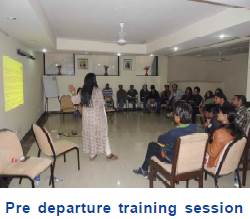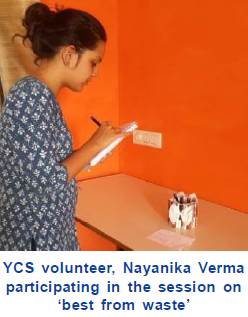|
Youth Citizen Service Leadership Programme I ndia is witnessing a demographic transition. It has one of the highest and the fastest-growing youth populations in the world. By 2020, India’s population is expected to become the world’s youngest. More than 500 million Indian citizens will be under 25 years of age and more than two thirds of the population will be eligible to work. This ‘demographic dividend’ offers a great opportunity to India.In a society as complex and diverse as India, the challenge is to ensure that this huge cohort becomes a vibrant, constructive force that realises its full social, economic and human potential. To facilitate the process, it is imperative that youth participate actively in all relevant levels of decision-making processes because it affects their lives today and has implications for their future. Youth involvement in achieving the sustainable development goals is also very crucial. Young people are the leaders of today and pivotal players in tackling global development issues and playing a key role in the decision making processes, at all levels of society. Involving youth for designing and implementing the goals is essential for the success of the SDGs. Young people have been deemed as the torch bearers of the SDGs. UN Secretary General, Ban Ki Moon has in his synthesis report – ‘The Road to Dignity to 2030: Ending Poverty, Transforming All lives and Protecting the Planet’ pointed to the fact that the ‘realities of 1.8 billion youth and adolescents represent a dynamic, informed and globally connected engines of change. Integrating their needs, right to choice and their voices in the new agenda, will be the key factor for success.’ The Government of India (GoI) currently invests more than Rs 90,000 Crores per annum on youth development programmes or approximately Rs 2,710 per young individual per year, through youth-targeted (higher education, skill development, healthcare) and non-targeted (food subsidies, employment) programmes. In addition, the state governments and a number of other stakeholders are also working to support youth development and to enable productive youth participation. 1In order to sensitise young people about development
concerns, Youth Citizen During their stay, they get disconnected from their city lives and immerse completely in the rural life. With minimum distractions, they get a lot of space and time to reflect on their lives. Volunteers spend their first week in understanding the space and the concerns and plan their interventions for the 2 nd, 3rd and 4th week. The interventions are guided by the subject mentors working on the theme in the organisation. The last two weeks are spent in developing a business model for the intervention to ensure that the work is taken ahead effectively. The programme usually ends with the process of ‘action at home’ wherein volunteers plan and execute an activity to be done at their home location reflecting the learnings from YCS.The programme has completed its 4 cycles in December 2015. The 5th and 6th cycle of the Youth Citizenship Service (YCS) leadership challenge took place from 9 th Feb 2016 till 17th March 2016. For these twin cycles, volunteers were selected on the basis of an application form advertised across various social media sites and volunteer portals. A total of 65 applications were received from across the country to participate in the 5th and 6th YCS challenge. All applicants were called for a telephonic interview to gauge their suitability for the YCS Leadership Challenge.A total of 30 candidates were selected for the interview round at DA Headquarters. The final selection included group exercises and a personal interview. After a group discussion, the candidates were interviewed by a panel composing of senior representatives from Development Alternatives (DA) and Voluntary Services Overseas (VSO), the partner organisation. After the interviews, 20 candidates were selected as the final participants for the YCS programme. Selected volunteers were divided into groups of 2 and were sent to different locations. When on the field, volunteers were further divided into smaller teams and were allocated host homes and projects. Weekly interventions were planned to do capacity building of the volunteers to think from a larger perspective. Subjects like waste management, self-reflection, mobilisation, planning etc. were covered. Each team was supposed to do a community event during their stay to address the issue at a larger level. CASE STUDY Nayanika Verma 22, Political Scientist, Uttar Pradesh One moment I was just another ‘bahaar se padh kar waapas aayi’ city girl. The highlight of my everyday life was driving down to socialise with friends and family in upscale markets and then returning to my cozy private room to my laptop, surfing on my highspeed internet, mostly looking for jobs or just some direction for life. Another moment, I’m a ‘bahaar-se aayi yahaan service karne waali’ girl. Only, this time ‘bahaar’ meant my own country. My days now include sharing a room, washing my own clothes with no choice or say in setting the menu, practicing yoga at sunrise every morning and on some nights going to bed underneath the starstudded sky. As a student of policy and development and within my academic horizons, I had a carefully constructed image of the development sector. Six weeks working in the heart of rural India, gave me the opportunity to put theory to practice and helped me fill in the gaps in my understanding of the development sector with real world experiences. The programme is full of interactions, with spaces and people to learn from – experienced professionals as mentors and trainers, ground staff at the implementing agencies, local staff, fellow volunteers and of course the locals themselves. Living and working in what appear to be ‘rough conditions’ and with limited resources, away from the comfort of home and various distractions (read: the internet), opened up space for self exploration, discovery and rediscovery too! I realise now how I’ve always had access to luxuries, which I believed were necessities – western toilets, microwaves, airconditioners, cars, coffee and even showers or an extra bucket of water for a bath! One definitely learns how to value every rupee much more by observing how those with limited resources value every rupee. Our host family gifted us a ‘gullak’ (a traditional clay piggy bank) to encourage saving money! Back in the city, now when I am on the streets and when my eyes meet with a stranger, I don’t see a boy or a girl standing in front of me. Instead, I see potential. Everybody is exuberating potential, constrained by circumstances and compulsions. It’s just a matter of creating enabling environments – be it by the state or by private citizens. I have returned home, with a newfound confidence and with bigger dreams. ■ Shivani Sharma Endnotes 1 National youth policy 2014 |
 Service (YCS) Leadership Challenge was designed.
DA (Development Alternatives) has been working in collaboration with
Voluntary Services Overseas (VSO) for the last 2 years to ensure
qualitative intervention leading to a lasting impact on both volunteers
and the rural spaces. YCS is a platform which allows young people to get
hands on experience in addressing development concerns, build
perspectives and learn necessary skills. Youth are selected through a
competitive process from across India and then they are oriented on
volunteering and community work. Special attention is given to the
selection process to ensure diversity in terms of geography, gender,
caste, religion and disability. Volunteers are expected to stay in the
village for 6 weeks and work on projects related to Livelihood and
Education in Jhansi, Bundelkhand and Mirzapur, Uttar Pradesh. Volunteers
are divided into teams and each team gets a project which is to be done
in a specific geography.
Service (YCS) Leadership Challenge was designed.
DA (Development Alternatives) has been working in collaboration with
Voluntary Services Overseas (VSO) for the last 2 years to ensure
qualitative intervention leading to a lasting impact on both volunteers
and the rural spaces. YCS is a platform which allows young people to get
hands on experience in addressing development concerns, build
perspectives and learn necessary skills. Youth are selected through a
competitive process from across India and then they are oriented on
volunteering and community work. Special attention is given to the
selection process to ensure diversity in terms of geography, gender,
caste, religion and disability. Volunteers are expected to stay in the
village for 6 weeks and work on projects related to Livelihood and
Education in Jhansi, Bundelkhand and Mirzapur, Uttar Pradesh. Volunteers
are divided into teams and each team gets a project which is to be done
in a specific geography.